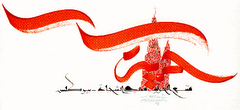The Bermuda triangle of the “Syrian crisis”
The situation in Syria is building towards a
regional war or chaos. However, Such chaos might spread to neighboring
countries and out towards the Gulf. All the while, Washington and Moscow are
playing a strategic game searching for advantage in any political settlement.
From the beginning of the Syrian crisis, the US has been leveraging the circumstances and its allies to improve its position for negotiations with Russia. American pragmatism positioned itself strategically both within Syria, as well as on the more regional level with other Arab governments.
From the beginning of the Syrian crisis, the US has been leveraging the circumstances and its allies to improve its position for negotiations with Russia. American pragmatism positioned itself strategically both within Syria, as well as on the more regional level with other Arab governments.
On one level, they are making use of the
Saudi-Qatari rivalry, which has opened serious cracks in the Gulf Cooperation
Council completely, elevating Qatar to a vital regional player.
On another level, the American’s success in normalizing
the diplomatic relationship between Turkey and Israel has also given Qatar the
upper hand, especially after the role it played in taming the rhetoric of
Khalid Mashal and Hamas. Nominally, this will weaken the Saudi and Jordanian
role in negotiations around Palestine, undermining the Arab peace initiative
and open the way for a Qatari brokered deal.
The Saudi-Iranian competition was another relationship
that the US used to put more pressure on the Iraqi government to change its
position on Syria. At the same time, the tentative Turkish-Kurdish settlement American
patronage was an essential leverage point to adjust the position of the Syrian
Kurds regarding the crisis. Add to this the surprising resignation of the
Lebanese government that will also add more tension to the regional climate.
The tensions on the Golan front are yet another
leverage point for America. The limited military provocations on the
Syrian-Jordanian borders, where there are many military, economic, social and
even administrative developments, warn of a potential regional war. This could
be seen as an attempt to put more pressure on Jordan to change its position
towards Syria, and influence policy on all sides of the Syrian borders.
The influence being exerted in Jordan was clear
during the press conference between King Abdullah II and President Obama in
Amman, when Obama noted that King Abdullah was the first to ask Bashar Al Assad
to step down, suggesting the Jordanian new position should start from this
point.
Since the first day of the crisis in Syria, the
Jordanian state showed a reasonable and balanced position reflecting Jordan’s
strategic interests. Jordan took a responsible position through regional and
international political activism that aimed to push the situation towards a
political settlement that preserves the interest of the Syrian people and the
stability of the region.
Jordan’s role in the Arab Summit was clearly aimed
to rationalize the immature politics that was pushing for any alternative
representation for Syria. This push, especially by Qatar, would likely lead to
catastrophic consequences on the ground in Syria and the region, as it would
lead to the fragmentation of the armed opposition within Syria, consequently
making communications with those armed factions near impossible and creating a
breeding for autonomous armed groups.
This could clearly lead to disastrous results that
are difficult to contain. A clear sign of this crisis came after the refusal of
the FSA to recognize the interim government. The impacts of this decision were
quickly seen within the FSA, as Col. Riad Al-Assad the founder of the FSA leg
blown off in car bomb.
So far, the Russian position seems to be fairly
calm as Moscow knows that most of the American allies in the region are
incapable of taking any unilateral steps that might lead to a regional war or
further chaos. Tensions, however, have the potential to spread to different
geographical areas, from Afghanistan, Africa and the Korean peninsula.
Russia is also playing the game, with the
recent threat from the Russian Foreign minister Lavrov to call off the Geneva
communiqué. There were also the recent Russian naval drills ordered by
president Putin that surprised not only the Russian armed forces, but also the
neighboring countries as well, especially Turkey.
As always, the countries involved are looking
to leverage this situation to their own advantage, while regional chaos looms,
the power plays continue.
Dr.Amer Al Sabaileh
Posted 10 hours ago by Amer Al Sabaileh







Aucun commentaire:
Enregistrer un commentaire